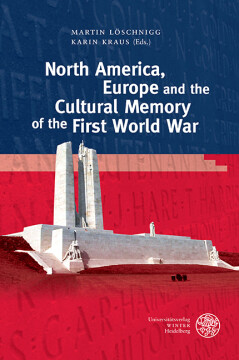
BUCH
North America, Europe and the Cultural Memory of the First World War
Herausgeber: Löschnigg, Martin | Kraus, Karin
Anglistische Forschungen, Bd. 453
2015
Zusätzliche Informationen
Bibliografische Daten
Abstract
The First World War represented a watershed in US-American and Canadian relations with Europe. It re-defined images of the Old World and the New on both sides of the Atlantic, leading to the demise of Europe as a cultural model for many U.S. and Canadian writers and artists. In Canada in particular, the war has come to be regarded as a milestone on the road to nationhood, as a strong sense of ‘Canadianness’ emerged from the country’s military engagement on the European battlefields. In Europe, in turn, the influx of North American soldiers heralded future cultural influences from across the Atlantic. The present volume investigates the cultural memory of the ‘Great War’ of 1914–1918 from a transatlantic perspective. Its chapters analyze the way in which literature, art and film have rendered the various encounters and confrontations between the Old and New Worlds which took place in the course of the war, and the significance of the war as a crucial episode in transatlantic (cultural) history.
Inhaltsverzeichnis
| Zwischenüberschrift | Seite | Aktion | Preis |
|---|---|---|---|
| Cover | C | ||
| Title Page | 3 | ||
| Copyright | 4 | ||
| Contents | 7 | ||
| Martin LÖSCHNIGG (Graz), Introduction: Canucks, Doughboys and the Great War in the Old World | 9 | ||
| I. The Great War in an International Perspective | 19 | ||
| Jay WINTER (New Haven/CT), Beyond Glory? Language, Memory, and the Great War | 21 | ||
| Holger KLEIN (Salzburg), Voices of Protest: Early English, French, and German Anthologies of Anti-War Poetry | 33 | ||
| Karin KRAUS (Graz), Charlie and the Hun: The First World War in Twenty-First Century Young Adult Fiction | 53 | ||
| II. Memorializing the War | 65 | ||
| Don SPARLING (Brno), Memorializing the Great War: Canada, Czechoslovakia, Hungary | 67 | ||
| Brigitte JOHANNA GLASER (Göttingen), Cultural Memory in Canada: Revisiting the Battlefields in Reality and Fiction | 79 | ||
| III. Remembering the Great War in Canadian Literature and Art | 93 | ||
| Anna BRANACH-KALLAS (Toruń), Narratives of (Post-)Colonial Encounter: The Old World in Contemporary Canadian Great War Fiction | 95 | ||
| Martin LÖSCHNIGG (Graz), Fighting the War in Europe: Canadian Literature and the Loss of ‘New World Innocence’ in World War I | 107 | ||
| Marzena SOKOLOWSKA-PARYŻ (Warsaw), Remembering German Canadians in Jane Urquhart’s The Stone Carvers and Paul Gross’s Passchendaele: ‘Alien Citizens’ versus ‘the Birth of a Nation’ | 121 | ||
| Sherrill GRACE (Vancouver), Staging the Great War: The Haunted Landscapes of Canadian Theatre | 133 | ||
| Zachary ABRAM (Ottawa), “Shut up, Sky Pilot”: The Limits of Rebellion in Charles Yale Harrison’s Generals Die in Bed | 145 | ||
| Laura BRANDON (Ottawa), Making a New World: War, Art, and Identity in the Landscape Paintings of A.Y. Jackson | 157 | ||
| IV. The U.S. Experience | 169 | ||
| Waldemar ZACHARASIEWICZ (Vienna), Echoes from the Western Front: Stages in the Transformation of Germans / German Americans in the Media from Models into Dangerous Antagonists | 171 | ||
| Thomas F. SCHNEIDER (Osnabrück), “Not War Any Longer, but a Slaughter”: Representations of Americans in German War Literature During and After the First World War | 185 | ||
| Walter HÖLBLING (Graz), The U.S.-American Authors and World War I: ‘Cultural Paradigms’, (Auto-) Stereotypes, and ‘Gendered Eyes’ | 201 | ||
| Stefan L. BRANDT (Graz), A Farewell to the Senses? Hemingway, Remarque and the Aesthetics of World War I | 215 | ||
| Marek PARYŻ (Warsaw), Expatriate Americans in Paris at the Time of the Great War: Edith Wharton’s A Son at the Front | 227 | ||
| Notes on Contributors | 237 |


 Publishing Platform by CloudPublish
Publishing Platform by CloudPublish